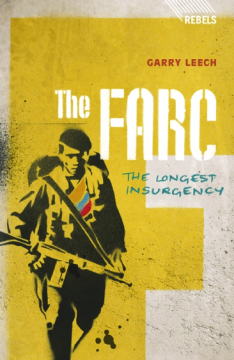
Additional Information
Book Details
Abstract
Garry Leech has written the definitive introduction to the FARC, examining the group's origins, aims, and ideology, and looking at its organizational and operational structures. The book also investigates the FARC's impact on local, regional, and global politics and explores its future direction.
'Rebels' is an exciting and innovative new series looking at contemporary rebel groups and their place in global politics. Written by leading experts, the books serve as definitive introductions to the individual organizations, whilst seeking to place them within a broader geographical and political framework. They examine the origins, ideology and future direction of each group, whilst posting such questions as 'When does a "rebel" political movement become a "terrorist" organization?' and 'What are the social-economic drivers behind political violence?'.
Provocative and original, the series is essential reading for anyone interested in how rebel groups operate today.
'Using original sources and key interviews, this book serves as an invaluable guide that places the FARC, Latin America's oldest and largest insurgency movement, in its political, economic and strategic context.'
Doug Stokes, University of Kent at Canterbury
'You may disagree with this book. But whether you believe that the FARC are terrorists, drug traffickers, the armed poor, freedom fighters, or just a group that has lost its way, Garry Leech's history of the guerrillas will make you view them differently - and may change your view of Colombia's long conflict and how it can be brought to an end. "The FARC" acknowledges and addresses the many deserved criticisms levelled at Latin America's oldest insurgent group, and seeks to explain what continues to motivate it today. Whether you think the FARC should be fought, negotiated with, or both, Leech's book is an essential text. There's nothing like it in English.'
Adam Isacson, Director of the Regional Security Policy Program at the Washington Office on Latin America
'A predominant characteristic that separates a strong investigative journalist from someone who simply reports already existing information is the distinction of integrity to acknowledge that which is not so readily or openly supported by popular discourse. Such a description fits well when concerning the work of Garry Leech, as shown within The FARC: The Longest Insurgency. Not only does Leech put into context the historical importance of this movement, and its response to Colombia's political-economic inequalities, but he provides a detailed analysis of what the guerrilla have done in an attempt to create a more socially respectable environment for the betterment of the majority rather than a continuity of enrichment for a select few. It is for these reasons that this work is essential reading for a wide variety of scholars, social activists, concerned citizens, and social justice advocates, as Leech is able to shed light on the important events and issues facing Colombian(s) society. A reality that is sorely unaddressed or, even worse, structurally misinformed through instruments of the popular media and so-called academic scholarship.'
James J. Brittain, Associate Professor within the Department of Sociology, Acadia University, Nova Scotia, Canada
'Provides an excellent account of the insurgent group and cogently challenges many of the simplistic
assumptions inherent to mainstream narratives of the FARC.'
David Maher, Critical Studies on Terrorism
Garry Leech is an independent journalist and also teaches international politics at Cape Breton University in Nova Scotia, Canada.
Table of Contents
| Section Title | Page | Action | Price |
|---|---|---|---|
| Rebels\r | i | ||
| About the Author | ii | ||
| Acknowledgements | vi | ||
| Colombia Timeline, 1948–2010 | vii | ||
| Map of Colombia | xiii | ||
| Introduction | 1 | ||
| 1 The Roots of the FARC | 4 | ||
| The Violence | 7 | ||
| The Role of the Communist Party | 10 | ||
| Operation Marquetalia | 14 | ||
| The Agrarian Crisis | 18 | ||
| The FARC’s Early Strategy | 21 | ||
| 2 The FARC’s Political Front | 25 | ||
| The Patriotic Union | 27 | ||
| The Reactionary Response | 29 | ||
| A Return to War | 33 | ||
| 3 The FARC’s Social Project | 38 | ||
| The Role of JACs | 41 | ||
| A War of Position | 46 | ||
| Life as a Guerrilla | 48 | ||
| 4 The FARC and the Drug Trade | 56 | ||
| The War on Drugs | 57 | ||
| The Coca Boom | 60 | ||
| The ‘Narco-Guerrillas’ | 67 | ||
| 5 From ‘Narco-guerrillas’ to ‘Narco-terrorists’ | 75 | ||
| A Military Solution | 77 | ||
| The Terrorist Lens | 85 | ||
| The Democratic Security Strategy | 88 | ||
| The Oil Factor | 94 | ||
| Terrorists or Belligerents? | 100 | ||
| 6 The FARC and Human Rights | 104 | ||
| Targeting Civilians | 109 | ||
| Civilians as ‘collateral damage’ | 119 | ||
| Distorted Perceptions of Human Rights Abuses | 125 | ||
| 7 The Future of the FARC | 137 | ||
| The Dirty War Continues | 140 | ||
| A Political Solution? | 144 | ||
| Conclusion | 150 | ||
| Notes | 154 | ||
| chapter 1 | 154 | ||
| chapter 2 | 156 | ||
| chapter 3 | 157 | ||
| chapter 4 | 158 | ||
| chapter 5 | 160 | ||
| chapter 6 | 163 | ||
| chapter 7 | 165 | ||
| Bibliography | 168 | ||
| Index | 173 |
